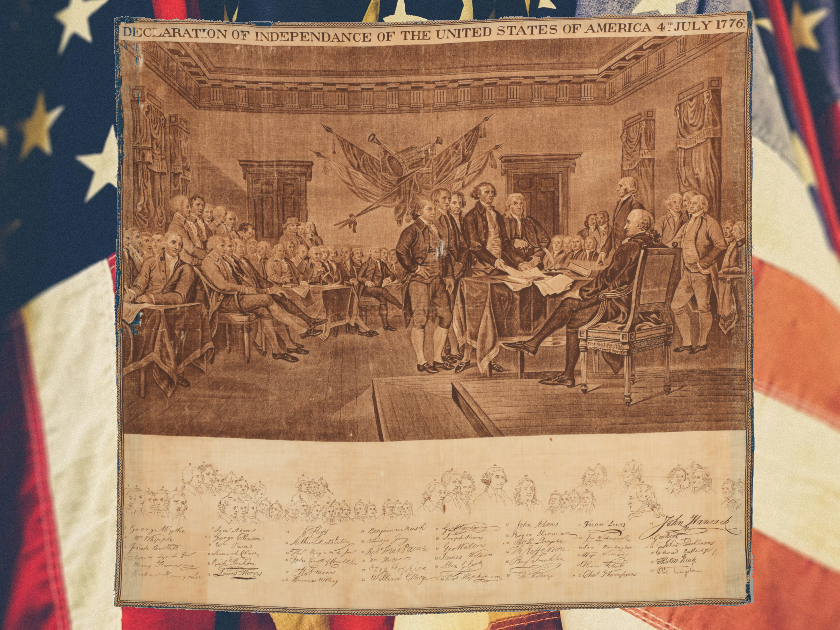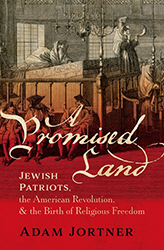
Event handkerchief, The Metropolitan Museum of Art, Gift of Bella C. Landauer, 1944.
Background photo by Jakob Owens on Unsplash
The virus that is antisemitism takes a number of forms, but it might just be possible to vaccinate people against one particular American variant. I’m talking about the form that insists America is a “Christian nation” — a nation and government founded by Christian people for Christian purposes. People who say these things often buttress their claims with vague references to the US Constitution and Declaration of Independence as Christian documents. The American Revolution was not only a patriotic war, they say, but a patriotic war fought by Christians for Christians. To be a patriot, then, is to be a Christian. The rest of us are B‑listers. Many Americans accept this version of the Revolution at face value, because the Revolution took place in old-timey days, and everybody knows the Jews didn’t show up in America until Ellis Island.
All of this is nonsense. Of course Christians fought in the Revolution, but so did a lot of people — including Jews. In fact, Jewish patriots left evidence of their patriotism in Yiddish. One Jewish patriot wrote in 1770 that he thought George III was full of narishkeit, and another called American soldiers rookim—Yiddish for “nonsense” and “tough guys,” respectively. The 1779 Battle of Beaufort featured a militia unit known as “the Jew Company” because twenty-six of its forty members were Jewish. George Washington and his army promoted Jews to officer status, something no Jew in Europe experienced at the time. The Richmond Synagogue celebrated independence by writing a prayer whose first lines spelled out “VASHINGTON” in Hebrew letters. (There is no “W” sound in Hebrew.) A parade for the Constitution in Philadelphia featured a kosher table.
I’ve spent the last few years collecting stories and memories about these Jewish patriots for my new book, A Promised Land. Many Jews fought for independence, and others took massive risks to aid the fight. The patriot Jews of New York City actually fled when the British occupied the city; the refugee Jews established Connecticut’s first minyan. Yet accounts of Jewish and US history have largely passed over these stories. So many more Jews arrived in America through Ellis Island and other ports a century after independence that textbooks simply assume that religious diversity was something that happened in the 1870s. It wasn’t. When the British seized Savannah, the new governor banned Jews from the province. As he told George III, the Jews “were found … to be violent rebels and persecutors of the King’s loyal subjects.” We know the revolutionary patriots weren’t all Christians because a British commander banned Jews as the people most likely to be patriots.
One Jewish patriot wrote in 1770 that he thought George III was full of narishkeit, and another called American soldiers rookim—Yiddish for “nonsense” and “tough guys,” respectively.
America in 2024 is suffering through a crisis of originalism — the notion that certain kinds of people founded this country, and that those folks and their descendants are the “real” Americans. Often this works out as the idea that white Christians founded the country and should therefore have some kind of citizen-plus status giving them slightly more rights than everybody else. Responses to this doctrine rightly point out that American citizenship is legal, not biological: the country is whatever its citizens say it is, whether it looks like the Revolution or not.
But originalism is not just a legal error — it’s historical junk. The idea that only certain kinds of people fought for the Revolution is hogwash. Washington enlisted Black men in the army. Women wore men’s clothing to take up arms against the British. (One of them, Deborah Sampson, became one of the first Army Rangers in 1782.) Americans had an ally in Hyder Ali, an Asian and Muslim sultan who fought the British in India as part of the global war against George III, and whose name was celebrated and toasted in the young nation. When American Jews revolted against the crown, they threw off the existing law that limited citizenship and high public office to Protestants only. Mordecai Sheftall, as a Jew, would not have been able to hold office in 1774 Georgia. But he became a de facto leader of Savannah when the patriots took control there in 1775. The revolution was more diverse than we have been led to believe.
Christian nationalists have it exactly backward: when the Revolution ended, religious freedom expanded. Virginia got rid of its state church in 1786. By 1792, every state with a synagogue also got rid of religious qualifications for holding office. In 1800, when an American court heard an appeal based on the notion that only Christians could be believed under oath, Alexander Hamilton himself defended Jews’ rights to testify, arguing that there were no religious limitations to citizenship. And of course, George Washington explicitly wrote to the Jews of Rhode Island that “[a]ll possess alike liberty of conscience and immunities of citizenship.” Religious qualifications for citizenship are one of the first things Americans got rid of once the country was founded.
Our national discussion will likely not be transformed by thinking about Jews and the Revolution, but the American Jewish community (and the country at large) deserves to understand the American Revolution as a little more Jewish. The notion that Christians founded the country in the name of Christianity is, like George III, narishkeit.
